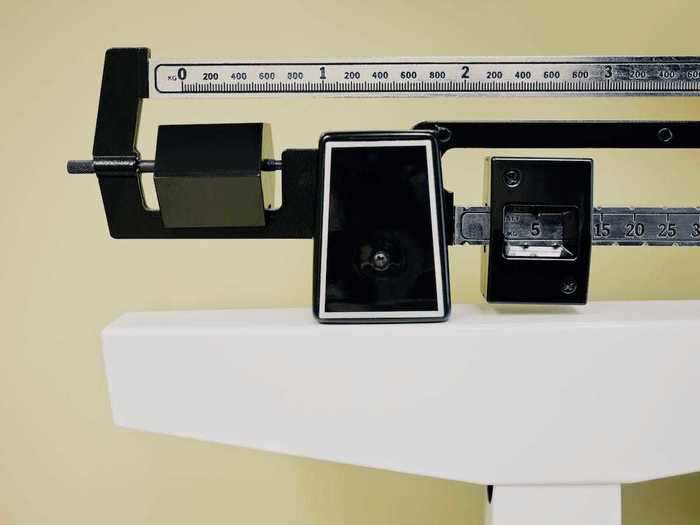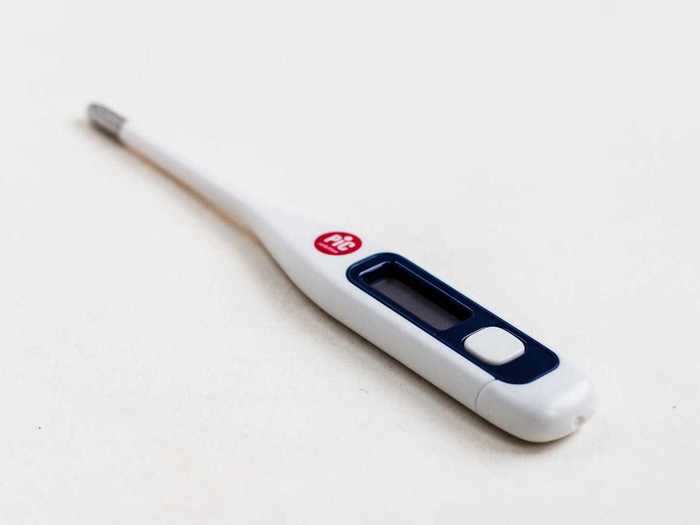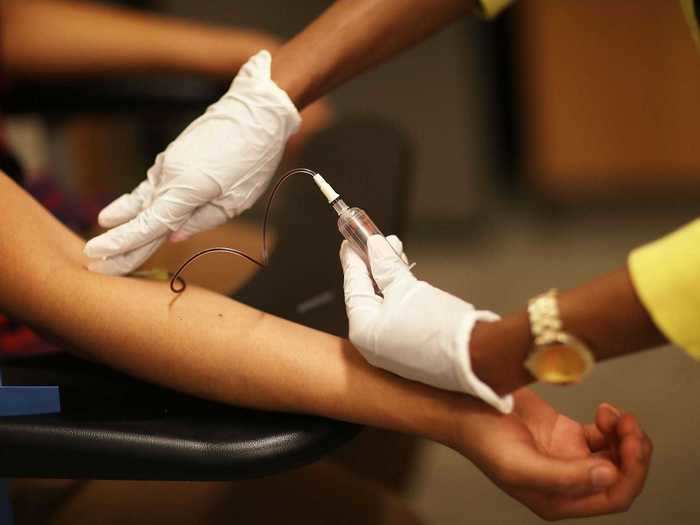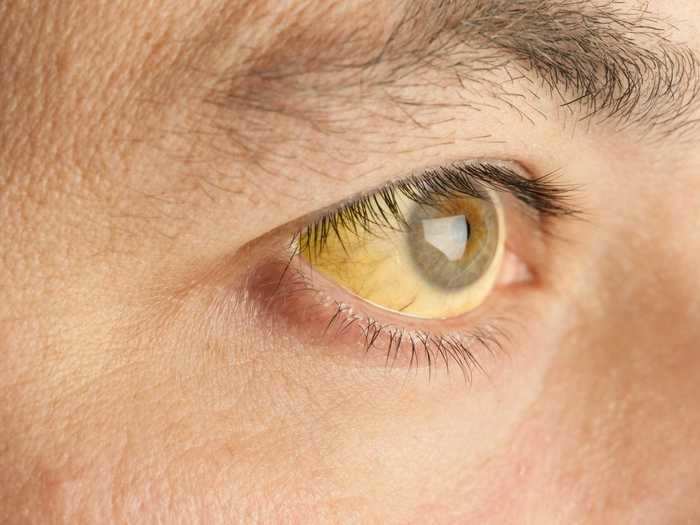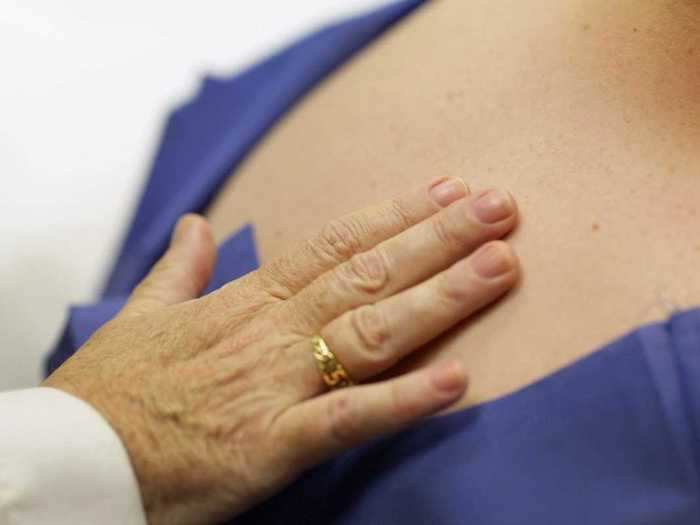Feeling full after just a few bites of food could be a symptom of ovarian cancer.Shutterstock - According to the American Cancer Society, cancer can occur anywhere in the body, and cause "almost any" symptom.
- Some symptoms can be very subtle, such as fatigue. Others may be more obvious, like pain or fever.
- Here's what to watch out for, and when to take your concerns to a medical professional.
Cancer can occur anywhere in the body and cause "almost any" symptom, according to the American Cancer Society, or the ACS. Sometimes these symptoms are impossible to ignore. But sometimes they're vague and all too easy to brush aside or miss completely.
But noticing cancer symptoms is important, since treatments work best when the disease is found early. So Insider asked two doctors — Dr. Ioana Bonta, a medical oncologist at Cancer Treatment Centers of America, and Dr. Marleen Meyers, a breast medical oncologist at NYU Langone Medical Center — about cancer symptoms you might miss.
Both stressed that even if you notice a possible sign of cancer, you shouldn't panic. Lots of symptoms that sometimes indicate cancer are most often caused by something totally benign.
"Unless the symptoms are interfering with your day to day life or life-threatening, the key is to keep an eye on it for a while and see if it goes away, because for most people it will," Meyers said. Her rule of thumb: If a new symptom doesn't resolve after about two weeks, that's a good time to call your doctor.
This list is by no means exhaustive — symptoms can vary greatly based on cancer type, size, and location in the body — but it's a good place to start. Here are 14 possible symptoms to look out for.
1. Fatigue
Pay attention to persistent fatigue that you can't easily explain.
Photographee.eu/Shutterstock
Both Bonta and Meyers listed fatigue — tiredness that doesn't get better with rest — as a cancer symptom that's easy to miss.
This can include insomnia (feeling tired but being unable to sleep), sleeping more than usual without feeling rested, or a general sense of lethargy or lack of energy.
"When you have fatigue, my recommendation is do a little bit of analysis," Bonta said. There could be any easy explanation — maybe you've been sleeping poorly or recently started a new medication.
"But if all the other things are in order and this is a new symptom for you, then I'd be worried about it," Bonta said.
2. Skin bumps
Skin cancer can look innocuous.
iStock
"One thing that's often overlooked are skin cancers and skin lesions," Meyers said. "Skin cancers don't necessarily look ugly and scary. They sometimes can look like just little raised pink growths."
Melanomas — the most deadly type of skin cancer — aren't necessarily pigmented, she added. They can also occur in odd places in the body, including under your fingernails and toenails.
"For skin cancer we have to know our own skin and see if there's any change," Bonta added. Here's a simple guide to skin checks from the American Cancer Society.
A wound that won't heal is another potential sign of skin cancer, dermatologist Dr. Allison Arthur previously explained to Insider.
"A common story that my patients will tell me is, 'I have this sore, I thought it was a pimple, it bled, and then I thought it was going away but then it bled again,'" she said.
3. Feeling full really quickly
Feeling full after just a few bites? It might be worth seeing your doctor if the feeling persists.
Flickr/Rachel Hathaway
4. Poor appetite
A decrease in appetite may sometimes be worrisome.
TeoLazarev/Getty Images
5. Unexplained weight loss
Watch out for dropping weight.
Paul Velgos/Shutterstock
Bonta said that unexplained weight loss can be a symptom of cancer. If you drop 10 pounds or more without trying to, it's worth calling your doctor.
The ACS says unexplained weight loss happens most often pancreatic, stomach, esophageal, and lung cancers.
It can also be a symptom of several types of blood cancer, which are among the more difficult cancers to spot, according to a new UK campaign called "Make Blood Cancer Visible."
6. Breast rashes
Monitor your breasts for skin changes as well as lumps.
Thomas Foldes/Shutterstock
7. Bloating
Bloating or a swollen stomach can be a warning sign, especially combined with other symptoms.
wavebreakmedia/Shutterstock
People with ovarian cancer may also experience bloating or a swelling stomach, Bonta said.
"If a woman reports pelvic or abdominal pain, increased abdominal size, bloating, difficulty eating, or feeling full quickly — and if the symptoms are new within the past year and if they occur more than 12 times per month — it's a red flag."
8. Fever
It's not common, but fever may be an early sign of certain blood cancers.
Marco Verch/Flickr
Bonta said that fever is sometimes a cancer symptom. Most often, it's a sign that a cancer has spread to a different part of the body than where it started, but it can be an early symptom of blood cancers leukemia or lymphoma, according to the ACS.
A temperature of more than 100.5 degrees Fahrenheit is concerning, especially if it persists for more than 24 hours or is accompanied by shaking or chills.
9. Night sweats
Waking up soaked in sweat can be a red flag.
demaerre/Getty Images
Excessive sweating after bedtime can be a sign that something's going on with your health, especially if the weather doesn't warrant it.
Night sweats can indicate lymphoma, a cancer of the immune system. However, it's usually accompanied by other symptoms on this list like fever, fatigue, and weight loss.
10. Persistent hoarseness or coughing
If your cough or sore throat lasts more than three to four weeks, check with a doctor.
AaronAmat/ iStock
Plenty of common, noncancerous ailments can cause a cough or hoarseness, from allergies to respiratory infections.
But if you lose your voice for longer than three or four weeks, that may be an early symptom of throat cancer, according to Cancer Research UK. Other signs to watch out for include shortness of breath and difficulty swallowing.
11. Pain
Mysterious, long-lasting pains could signal a problem.
Koldunova Anna/Shutterstock
"Any pain that's out of proportion with your activity is a red flag," Bonta said. "If I go to the gym today and I pull a muscle, I have a reason for pain. But if I have leg pain, I don't remember injuring my leg, it doesn't go away, and three days later I still have to take pain medication, that's a problem."
Unexplained pain can be an early warning sign of a variety of cancers depending on where it is in the body, according to ACS. A persistent, untreatable headache could be a symptom of brain cancer. Back pain may indicate colon cancer, rectum cancer, or ovarian cancer. General pain, without an obvious cause, is sometimes a symptom of bone cancers or testicular cancer.
12. Anemia
A low red blood cell count could indicate colorectal cancer.
Joe Raedle/Getty Images
People with anemia don't have enough healthy, normal red blood cells. Iron-deficiency anemia — the most common type, according to the Mayo Clinic — can occur because of blood loss.
Bonta said some iron deficiency anemia is easily explained — it can happen to women with heavy periods, for example. But unexplained iron deficiency anemia may be a "red flag" for cancer in the colon or rectum, she added.
The ACS explains that some colorectal cancers, as they're often called, can bleed into the intestine. Over time that loss of blood may lead to anemia, and the blood may not always be visible or noticeable in the stool. In fact, the ACS says, a blood test that reveals a low red blood cell count is sometimes the first sign of a colorectal cancer.
13. Changes when you go to the bathroom
Keep tabs on what's normal for your urinary and bowel habits.
Buckeye Sailboat/Shutterstock
Changes in bowel movements or urine can be signs of a few different cancers.
Blood in the stool is never a good sign, especially if there's not an obvious cause. It signify stomach cancer or colorectal cancers. Other changes in bowel movements, like diarrhea or constipation that last more than a few days, can also be signs of colorectal cancer, the ACS explains.
Bonta said that in men, symptoms like blood in the urine, needing to pee freqeuntly at night, sudden urges to urinate, or a weak stream of urine could indicate prostate cancer.
In women, urinary frequency and urgency can be signs of ovarian cancer, according to the ACS.
And in all people, certain urinary changes may also be symptoms of kidney and bladder cancers, the ACS says. So it pays to be alert and notice when there's a long-lasting change in your normal bathroom habits.
14. Skin or eye yellowing
MediaProduction/Getty Images
Jaundice — or the yellowing of your skin or eyes — is most commonly the first sign of pancreatic cancer, according to the American Cancer Society.
The yellowing of the skin is caused by a build-up of bilirubin, which is made in the liver and typically is released to the intestines from the pancreas through the common bile duct where it helps break down fats during digestion.
Pancreatic cancer can compromise the common bile duct and cause bilirubin to build up in the bloodstream, leading to the yellowing. Liver cancer can also cause jaundice.
Dark urine, light-colored stool, and itchy skin are other symptoms of jaundice to watch out for aside from the yellowing of skin.
Remember: Don't panic.
Not every one of these symptoms is a surefire sign of cancer.
Joe Raedel/Getty
Not every symptom indicates cancer, and not every symptom warrants a battery of tests. Both Meyers and Bonta stressed that unnecessary testing can actually be harmful.
"The financial costs and psychological costs can be very high," Bonta said. "Talk to any patient who ever had a biopsy about what you're going through psychologically while you're waiting for it and while you're having it."
Some testing and screening procedures have risks or complications, too. CT scans, for example, expose your body to radiation. A doctor will know when a scan, biopsy, or other test is truly going to be more helpful than harmful.
"I think, in general, we don't want people to panic," Meyers said. "Give [a symptom] a little time to see if it goes away. If it doesn't, then have it investigated."
Read more about the signs and symptoms of cancer at the American Cancer Society.





